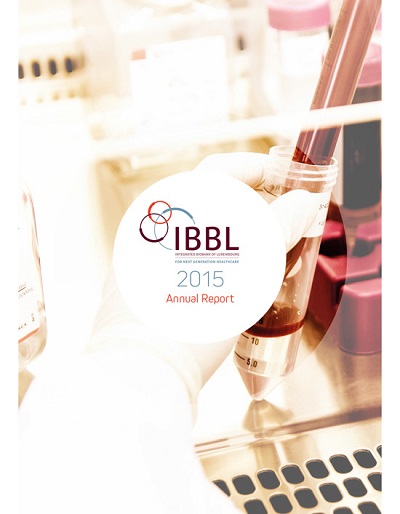
In 2015, the Integrated BioBank of Luxembourg (IBBL) reached several milestones: the biobank gained ISO accreditation, won a national price for its quality, launched several new large-scale research projects, expand its service offer, increased its third party funding and even organised the world’s largest microbiome conference in Luxembourg.
Since its creation in 2008, IBBL has substantially expanded its activities on a mission to provide biospecimen-related services and a biobanking infrastructure for applied medical research. On the 1st of January 2015, IBBL became an autonomous institute organised within the Luxembourg Institute of Health (LIH), which allows IBBL and LIH to work even closer together.
Luxembourg takes center stage
One new collaboration between IBBL and LIH, as well as other local and international partners, is the National Centre of Excellence in Research – Parkinson’s Disease (NCER-PD), an 8-year research programme with the aim of diagnosing and stratifying Parkinson’s disease better and earlier. In spring 2015, IBBL started collecting biospecimens and clinical data for the programme, generating almost 10,000 aliquots of blood, urine, saliva and their components from just over 200 patients and healthy donors from Luxembourg and the Greater Region. Luxembourg also took centre stage in March 2015, when IBBL organised the fifth International Human Microbiome Congress (IHMC), attracting more than 500 researchers, biotech engineers and clinicians from 32 countries. Over the last few years, IBBL has become deeply invested in microbiome research, the field that studies the interactions between the human body and the billions of microorganisms that share it. In 2015, the biobank continued on this path by studying the best ways to process and annotating gut microbiome samples and preparing to launch the first Luxembourg gut microbiome cohort.
Quality hat-trick
As a service provider, IBBL has, since the beginning, put enormous emphasis on quality and built its whole operations around a formal Quality Management System (QMS). This strategy paid off on three levels in 2015. IBBL gained ISO 17025:2005 accreditation (general requirements for the competence of testing and calibration laboratories) and is now one of only a handful of biobanks worldwide to be accredited according to this norm. In addition, IBBL successfully passed the follow-up audits for its ISO 9001 and NF S96-900 certifications. However, the cherry on the cake was the Luxembourg Quality and Excellence Award, which IBBL received in the category for small enterprises as a recognition for its QMS as well as its efforts in terms of sustainability. The ultimate goal of the QMS is to ensure IBBL’s clients are satisfied and their needs are met. This is also the reason IBBL reformulated its service offer in 2015 and introduced a new service for the pre-clinical validation of biomarkers. Overall, with 16 new service contracts, substantially increased participation in the Proficiency Testing programme and great feedback from the students of the University Biobanking Certificate, the year proved fruitful for IBBL’s bioservices.
Prestigious research partnerships
Another big success for IBBL in 2015 was its membership in the CANCER-ID consortium, funded by the Innovative Medicines Initiative (IMI), a collaboration between the European Union and the European pharmaceutical industry. IBBL joined the ranks of 33 partners from prestigious academic and clinical research institutions, Small-and-Medium-sized Enterprises (SMEs) and the pharmaceutical industry with the goal of validating the use of blood-based biomarkers for cancer. Within the CANCER-ID consortium, IBBL works on the validation of laboratory methods, the development of standard operating procedures and the development of a proficiency testing programme. One reason why IBBL has become part of this consortium is the international recognition of IBBL’s Biorefinery department as one of the leading research groups focusing on the quality of biospecimens. In addition to their contribution to CANCER-ID, in 2015 IBBL’s researchers focused primarily on the evaluation of new technologies to improve the processing of tissue biospecimens. Overall, IBBL’s various biospecimen research projects led to ten scientific publications.
A look ahead
For the coming years, IBBL has a number of exciting and challenging new projects in the pipeline, including new tissue collections in France and Vietnam, the Luxembourg gut microbiome cohort and the National Cancer Plan. At the same time, IBBL will continue its efforts to increase third party funding by gaining new service contracts and grants from national and European research funding agencies. Last but not least, the biobank plans to expand the scope of its accreditation to more testing methods, while maintaining its current certifications.








